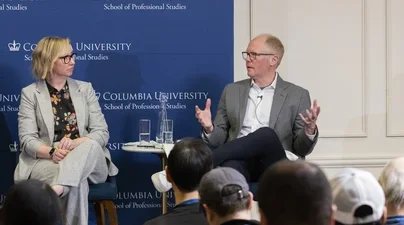In the modern election era, data and analytics are playing increasingly significant roles in determining the future of politics, and in turn our democracy. While Americans can access various news sources and perspectives, political analysts are gaining more sophisticated tools and insights into voter interests, concerns, and preferences.
Over 150 people attended the second annual Columbia University Political Analytics Conference in March, where leading industry, academia, and media experts came together to explore how data continues to shape American politics. The day-long event was hosted by Columbia’s M.S. in Political Analytics program. It featured four panel discussions and a keynote address by CNN Director of Polling and Election Analytics Jennifer Agiesta.

(left to right): Panelists Doug Usher Ph.D., Wes Anderson, Michael G. Miller, Ph.D., and Molly Murphy address discuss the future of political data.
A major theme throughout the conference was how analytics are evolving to meet the demands of a changing electorate and information environment. During the polling panel, Agiesta highlighted the growing presence of so-called “double-haters” in the 2024 election cycle—voters who have unfavorable views of both President Donald Trump and former President Joe Biden. This group made up 8% of all voters and broke in Donald Trump’s favor by 20 points in the 2024 election, and may have played a pivotal role in deciding the outcome of the election, especially as campaigns grappled with how to engage voters disillusioned with both major party candidates.
Adding to the discussion, Edison Media Research's Joe Lenski presented data showing a striking trend: Black and Hispanic self-identified conservatives are beginning to vote Republican at rates approaching those of white conservatives. “Political ideologies haven’t changed among Black and Hispanic voters, but what has changed is the driver of their vote,” Lenski emphasized. “Alignment with the candidate’s racial identity is becoming less important than in previous years.” The implications of this shift are substantial, as both parties re-evaluate long-standing assumptions about demographic coalitions and partisan loyalty.

Panelists Maeve Ward and Brent Seaborn discuss the role of technology in politics
The conference also took a close look at how Americans consume political information. In a dynamic session moderated by Dr. Basil Smikle Jr., director of Columbia’s M.S. in Nonprofit Management program, a live poll of the audience revealed the wide array of media sources used to stay informed, including traditional news outlets, podcasts, and social media platforms like X (formerly Twitter). The conversation highlighted how voter behavior is influenced by messaging and the increasingly fragmented channels through which information is delivered.
Another panel explored the transformative potential of data technologies in political strategy. Experts shared how new tools are revolutionizing campaigns targeting voters, measuring impact, and identifying credible information. From predictive modeling to real-time sentiment analysis, these innovations are changing how political actors engage with the public.
Students were engaged throughout the discussions, a central part of the conference's mission. Taylor Cook, a M.S. Political Analytics program candidate, reflected that “attending the 2025 Annual Political Analytics Conference was an enriching experience that underscored the pivotal role of data in modern politics.”
“As a continuing student in the Political Analytics program, I appreciated how this conference brought together themes from our coursework,” Taylor said. “The session on data technologies’ transformative potential in politics showcased emerging tools that could revolutionize campaign strategies. Overall, the conference reaffirmed my passion for data-driven political strategy and deepened my understanding of how innovative analytics can shape the future of civic engagement.”
Deputy Program Director Michael Schwam-Baird praised the event’s impact on both students and the broader field of political analytics. “The second annual Columbia University Political Analytics Conference was a remarkable success, bringing together top industry professionals and academics to examine the evolving role of data in politics and advocacy,” he said. “The panels and discussions not only highlighted cutting-edge insights but also provided invaluable opportunities for our students to engage with experts in the field, preparing them for meaningful careers in political analytics.”
As data becomes increasingly critical to democratic participation, the Political Analytics Conference is a vital platform for thought leadership, collaboration, and innovation in civic technology.

Deputy Program Director Michael Schwam-Baird addresses the crowd at the 2025 Political Analytics Conference.
About the Program
The Columbia University M.S. in Political Analytics program provides students quantitative skills in an explicitly political context, facilitating crosswalk with nontechnical professionals and decision-makers—and empowers students to become decision-makers themselves.
The 36-credit program is available part-time and full-time, on-campus, and online. The fall 2025 application deadline for the M.S. in Political Analytics program is June 1. Learn more about the program here.
For general information and admissions questions, please call 212-854-9666 or email politicalanalytics [[at]] sps [[dot]] columbia [[dot]] edu (politicalanalytics[at]sps[dot]columbia[dot]edu).


